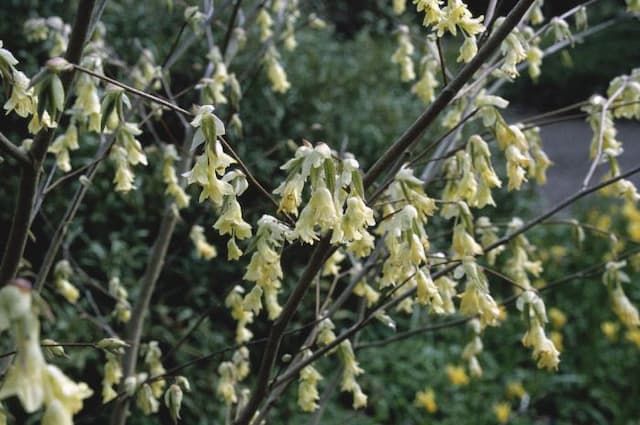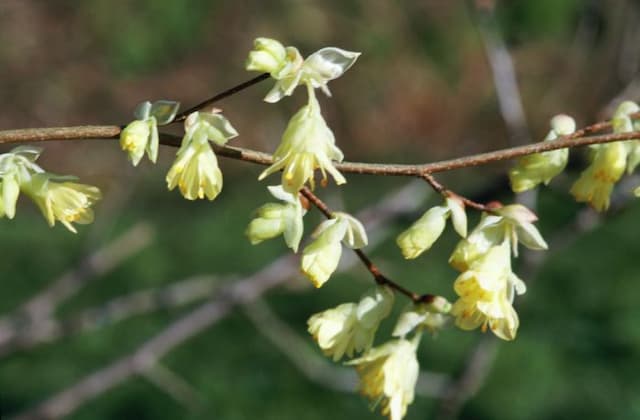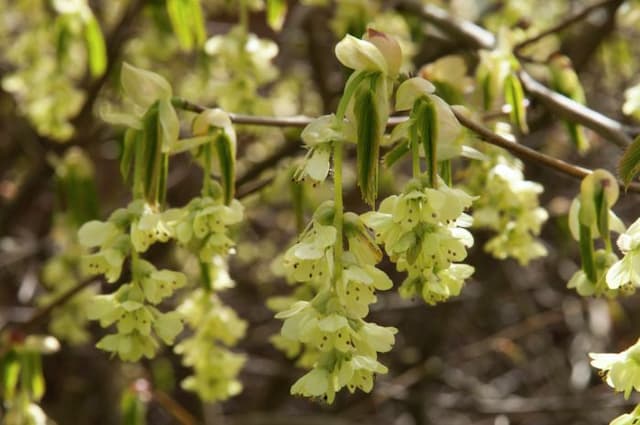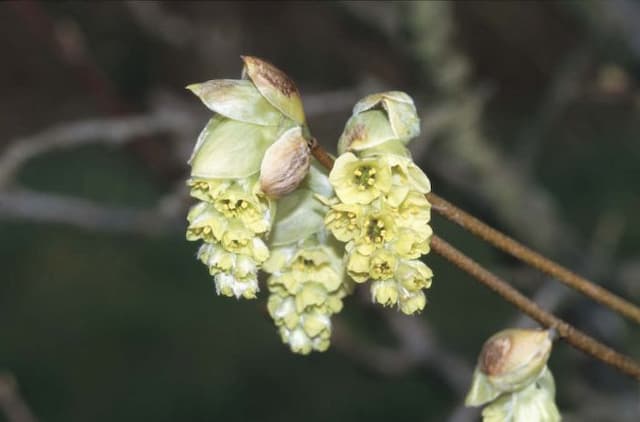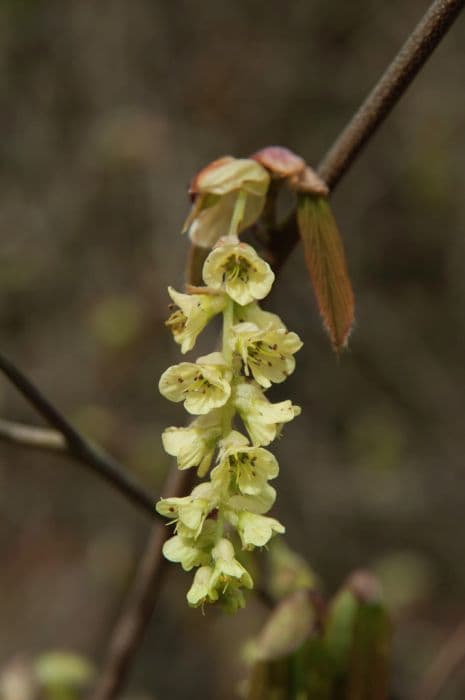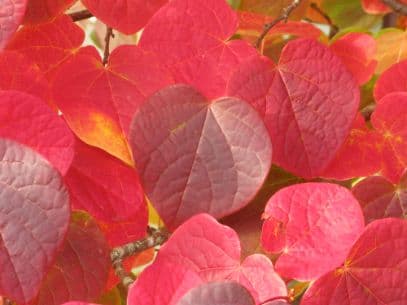Sweetgum Liquidambar styraciflua 'Silver King' (v)

ABOUT
The Sweetgum 'Silver King', recognized for its distinctive foliage and ornamental value, is a variegated cultivar that stands out in the landscape. Its leaves are star-shaped, featuring a mix of green and creamy white colors that appear almost as if they were brushed or splattered with paint. The variegation can vary from leaf to leaf, with some displaying a more dominant green or white coloration. In the autumn, the green portions of the leaves can transform into a mix of brilliant reds, purples, and oranges, adding a spectacular seasonal display of color. The tree produces distinctive spiky fruit balls, often called gum balls, which hang from the branches and persist into the winter, providing an interesting textural contrast to the tree's winter silhouette. The striking foliage of the Sweetgum 'Silver King' lends a bold and dramatic flair to any garden space.
About this plant
 Names
NamesFamily
Altingiaceae.
Synonyms
American Sweetgum, Silver King Sweetgum, Variegated Sweetgum.
Common names
Liquidambar styraciflua 'Silver King'
 Toxicity
ToxicityTo humans
Sweetgum 'Silver King' is not widely known to be toxic to humans. There is limited information on the ingestion of Sweetgum parts by humans, but there are no well-documented cases of poisoning or serious side effects. Nevertheless, as with many plants, it is prudent to avoid ingesting parts of the plant as they may cause digestive discomfort or other mild reactions in sensitive individuals.
To pets
The Sweetgum 'Silver King' is not classified as a highly toxic plant to pets. However, if pets were to ingest parts of the plant, like seeds or leaves, they might experience mild gastrointestinal upset, including vomiting and diarrhea. If a pet ingests a large amount of any part of the Sweetgum, it might become necessary to consult a veterinarian, as individual reactions can vary, and larger amounts could potentially lead to more significant digestive issues.
 Characteristics
CharacteristicsLife cycle
Perennials
Foliage type
Deciduous
Color of leaves
Variegated
Height
40-60 feet (12-18 meters)
Spread
20-25 feet (6-7.6 meters)
Plant type
Tree
Hardiness zones
5-9
Native area
North America
Benefits
 General Benefits
General Benefits- Ornamental Value: Its variegated leaves, which often have a silver edge, offer visual interest and aesthetic appeal to gardens and landscapes.
- Seasonal Interest: In the autumn, the leaves of the Liquidambar styraciflua 'Silver King', commonly known as 'Sweet Gum', turn to shades of red, orange, and purple, providing seasonal color variation.
- Shade Provider: With its broad canopy, Sweet Gum can provide a substantial amount of shade, creating a cooler environment in garden settings.
- Habitat for Wildlife: Sweet Gum trees are known to provide habitat for various bird species, offering nesting sites and food in the form of seeds.
- Fall Foliage Display: It is highly valued for its spectacular fall foliage display, which can greatly enhance fall landscaping.
- Soil Stabilization: The root system of Sweet Gum helps to stabilize the soil, preventing erosion in certain landscapes.
- Drought Tolerance: Once established, Sweet Gum has a degree of drought tolerance, making it suitable for regions with occasional water shortages.
- Toughness: It is a hardy tree that can withstand urban conditions and is resilient to many types of environmental stress.
 Medical Properties
Medical PropertiesThis plant is not used for medical purposes.
 Air-purifying Qualities
Air-purifying QualitiesThis plant is not specifically known for air purifying qualities.
 Other Uses
Other Uses- Liquidambar 'Silver King' can be used as a natural dye source. The leaves and bark contain tannins that can be processed into various shades of brown for textile dyeing.
- Woodworking with Liquidambar wood, known for its fine grain and ability to take on a high polish, making it suitable for ornamental objects or inlay work.
- The aromatic resin, sometimes referred to as American storax obtained from the tree, can be used in the production of incense and perfumes.
- Crafting of musical instruments where the wood of 'Silver King' is valued for its resonant qualities, particularly in the creation of woodwind instruments.
- Culinary use of leaves as a flavoring agent, where the leaves can be infused to add a unique spicy flavor to desserts or beverages, similar to the use of cinnamon.
- Photography, where the vibrant autumn leaves of 'Silver King' can serve as a natural backdrop or subject for seasonal photography.
- Leaf casting, an artistic process where the intricate leaves are used to create plaster or concrete casts for decorative art pieces.
- Bonsai cultivation, where the 'Silver King' is sometimes trained as a bonsai for its attractive foliage and manageable growth habits.
- Tannin extraction from the bark for use in leather tanning to impart color and durability to leather goods.
- Education and research, as 'Silver King' is often used in botanical and horticultural studies due to its distinct variegated foliage and adaptability.
Interesting Facts
 Feng Shui
Feng ShuiThe Sweetgum is not used in Feng Shui practice.
 Zodiac Sign Compitability
Zodiac Sign CompitabilityThe Sweetgum is not used in astrology practice.
 Plant Symbolism
Plant Symbolism- Change and Transformation: The American Sweetgum, particularly noted for its distinctly shaped leaves and their ability to change color dramatically with the seasons, symbolizes change and the ability to transform. Its vibrant fall colors serve as a reminder that change can be beautiful and natural.
- Healing: The resin from the American Sweetgum tree, historically used for medicinal purposes, signifies healing. This symbolizes the tree's capacity to offer solace and restoration.
- Adaptability: Because the American Sweetgum can thrive in a variety of soil types and conditions, it represents adaptability and resilience in the face of diverse circumstances.
- Longevity: The American Sweetgum can live for many years, making it a symbol of endurance and the passage of time.
 Water
WaterThe Sweetgum 'Silver King' should be watered deeply, making sure to saturate the root zone. It's important to let the soil dry out slightly between waterings, which typically means watering once or twice a week depending on the weather and soil conditions. During the growing season, especially in dry spells, you may need to increase the frequency. A general rule for established trees is to provide about 10-15 gallons per watering for each inch of trunk diameter measured at knee height. Always check the soil moisture to guide your watering schedule, as overwatering can be as harmful as under-watering.
 Light
LightSweetgum 'Silver King' flourishes best in full sun to partial shade. The ideal spot would offer at least 4-6 hours of direct sunlight per day. While it can tolerate some shade, too little light may lead to reduced foliage density and less vibrant fall coloration.
 Temperature
TemperatureThe Sweetgum 'Silver King' is hardy and can tolerate a wide range of temperatures. It can withstand temperatures as low as -10°F and as high as over 100°F, although it thrives in temperatures between 70°F and 80°F. Planting it in a location that avoids extreme cold winds can help ensure its health during harsh winters.
 Pruning
PruningPrune the Sweetgum 'Silver King' to maintain its shape and remove any dead or damaged branches. This is best done in late winter or early spring before new growth begins. Pruning every 2-3 years helps to keep the tree healthy and prevent potential damage, although any hazardous limbs should be removed as soon as they are noticed. Avoid excessive pruning, as it can stimulate unwanted growth.
 Cleaning
CleaningAs needed
 Soil
SoilThe best soil mix for the Sweetgum 'Silver King' is well-draining, rich loam with a pH of 5.5 to 7.5. Amend with organic matter to enhance fertility.
 Repotting
RepottingSweetgum 'Silver King' being a tree, is not commonly repotted. It is best transplanted outdoors when young and allowed to grow in place.
 Humidity & Misting
Humidity & MistingSweetgum 'Silver King' tolerates average outdoor humidity levels but does not require specific humidity conditions.
 Suitable locations
Suitable locationsIndoor
Not ideal for indoor growth; needs space, full sun.
Outdoor
Plant in a sunny spot, in well-drained soil, with ample space.
Hardiness zone
5-9 USDA
 Life cycle
Life cycleThe American Sweetgum 'Silver King' begins its life cycle as a seed, which after germination in the spring, grows into a seedling with characteristic variegated leaves. As the plant matures, it goes through a vegetative stage where it experiences rapid growth of stems and foliage over several years, becoming a young tree with a distinctive star-shaped leaf pattern. The tree reaches reproductive maturity and starts producing flowers—greenish-yellow in color for males and rounded clusters for females—these are usually wind-pollinated. Following pollination, the female flowers develop into spiny, woody, ball-shaped fruit capsules containing numerous seeds. These fruits persist through winter and release seeds the following spring, which can be dispersed by wind, water, and animals. Throughout its life, the 'Silver King' experiences an annual cycle of leaf growth in the spring, followed by a colorful transformation to reds and purples in the autumn before leaf drop in the winter.
 Propogation
PropogationPropogation time
Spring-Early Summer
The most popular method of propagation for the Sweetgum 'Silver King' is by seed. The best time for sowing seeds is in the late winter or early spring after a period of cold stratification, which involves chilling the seeds for 1-3 months at 33-41°F (0.5-5°C) to break dormancy. Once stratified, sow the seeds in a well-draining soil mix and lightly cover with soil. The soil should be kept moist but not waterlogged, and the seeds typically germinate within several weeks to a few months. Seedlings require ample light and should be gradually acclimated to outdoor conditions before being transplanted to their permanent location. It's important to note that 'Silver King' is a variegated cultivar; seeds may not come true to type, meaning they could lose the variegation or produce different characteristics from the parent plant.
